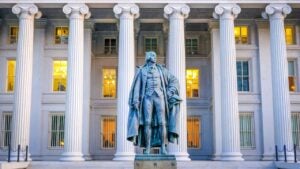Should I pay off my student loans early?

Key takeaways
- Paying off student loans early can benefit you financially, but it should typically come second to building your emergency fund and retirement savings.
- People with private student loans or without other debt tend to benefit more from paying off student loans early.
- If you have federal student loans and pay them off early, you could lose the opportunity to take advantage of a student loan forgiveness program (if you qualify).
- If it’s still worth it to you to pay off your student loans quickly, it may help to refinance your student loans as part of the process.
Paying off student loans early may seem like a good way to free yourself from debt and increase your disposable income. However, focusing on eliminating student loans may not always be the best choice.
For example, credit card debt tends to be more detrimental to your financial situation. So, if you’re one of the many Americans carrying high-interest credit card debt, paying off what you owe on your credit cards may be a higher priority. And, paying off student loans early may not be the best move if you haven’t started saving for retirement or lack an emergency savings fund.
While eliminating student debt may be a good choice under the right circumstances, it’s important to consider your total financial picture before taking this step.
Should I pay off my student loans early?
If you wonder, “should I pay off my student loans?” know that the answer to this question depends on your circumstances.
While paying your loans early is a big achievement, you need to make sure that it won’t be at the expense of other foundational financial goals, says Peter Dunn, CEO of Your Money Line.
“Establish an emergency fund, contribute to your employer’s retirement plan at least up to the match and prioritize any other high-interest debt before attacking your student loans,” Dunn says. “Once you’re on track with your core financial habits and obligations, then start looking at systematically paying down your student loans.”
Pay off your student loans early if:
- You’re saving a reasonable amount for retirement already. If you’re already saving money for retirement and you’re on track to reach your long-term goals, it can make sense to funnel some extra cash toward your student loans.
- Your income is high enough to fund other goals. If your income is high enough that you can save for your other financial goals with cash to spare, it can make sense to wipe out your student loans faster than normal.
- You have paid off all high-interest debt. If you are free of credit card debt and other high-interest debts, that’s another sign that it could make sense to pay off your student loans early.
- You have a fully funded emergency fund. You should pay off student loans early only if you have at least three to six months of expenses in a high-yield savings account. However, don’t use your emergency fund to pay for those student loans — keep it intact and available for true emergencies.
- You have private student loans. Since private student loan rates tend to be higher and these loans have fewer borrower protections, it could be a wise move to pay them off ahead of schedule to minimize the total cost of interest.
Don’t pay off your student loans early if:
- You’re not saving for retirement. Building a healthy retirement fund should be a top financial priority. If your employer offers 401(k) matching, aim to contribute at least as much as your employer will match. This “free money” can significantly accelerate retirement savings efforts. If you’re self-employed, contributing to an account like a SEP IRA or a solo 401(k) can help you prepare for retirement while lowering your taxable income.
- You have high-interest debt. Before paying off your student loans, prioritize eliminating other debt with higher interest rates. For instance, the average credit card interest rate is over 20 percent, much higher than most student loans charge. In the long run, it will cost you far more if you hang onto high-interest credit card debt.
- You don’t have any savings. If you don’t have any cash for emergencies or other goals, put any extra money there first. Maintaining an emergency savings account can help you avoid debt when unexpected expenses arise. And, there’s a good chance you may need to focus on this area. According to a 2024 Bankrate survey, 36 percent of U.S. adults have more credit card debt than emergency savings.
- You may want to utilize federal programs. If you have federal student loans and are considering signing up for an income-driven repayment plan or Public Service Loan Forgiveness, hold off on putting extra money toward your loans. Both of these programs allow you to have some of your balance forgiven.
Pros and cons of paying off student loans early
Paying off student loans early has its upsides and downsides. Here are some benefits and drawbacks of paying back your loan early.
Pros
- Pay less over the life of the loan: Because your student loan, like most other debt, accrues interest when you carry a balance, it’s cheaper if you pay off the loan earlier. It gives the debt less time to accumulate interest, meaning you’ll pay less in the long run.
- Get a head start on other financial goals: With one less monthly payment to worry about, you can use the funds you would apply to your student loans for other purposes. This can help with financial goals like saving for a house or retirement, paying down your mortgage balance or taking a vacation.
- Improve debt-to-income ratio: Getting rid of a significant monthly payment could improve your debt-to-income ratio, a measurement that most lenders evaluate when determining your qualifications for credit. With an improved debt-to-income ratio, you may be eligible for better interest rates on credit cards and mortgages.
- Financial freedom: Eliminating the burden of student loan debt and the accompanying monthly payments can provide flexibility and breathing room in your budget.
Cons
- Higher monthly payments: If you’re early in your career or aren’t making much money, you may struggle to pay off your student loans early. Paying off your loans early means making additional or larger payments, so you should only increase your student loan payments if you can afford to do so without making undue sacrifices.
- Draws focus from other financial goals: There are certain financial goals you shouldn’t wait on, and focusing on your student loans could take away from them. If you don’t have an emergency fund yet, for instance, send any extra payments there first.
- No opportunities for student loan forgiveness: If you’re eligible to have your student loans forgiven after a certain amount of time based on your career, it doesn’t make sense to repay your loans early. You’re better off making your required payments until the debt is forgiven.
- Loss of tax benefits: With your student loan debt eliminated, you’ll no longer be able to claim a tax deduction for the interest paid on your loan. The deduction, which is up to $2,500 annually, applies to both federal and private loans. While the tax benefits aren’t valuable enough to justify remaining in debt, it’s worth keeping in mind when tax season rolls around.
How can you pay off student loans early?
If you’ve decided that paying off your student loans early is the best choice for you, here are some of the best ways to go about doing it:
- Pay more than the minimum payment: Paying more than the minimum on your student loans can help you lower the principal of your balance and pay off your loans faster. If you’re curious about how much time you could save by making a larger payment, a student loan calculator can help.
- Pick up a side hustle: Look for ways you can earn some extra cash to throw toward your student loans. For example, pick up babysitting gigs, drive for Uber or Lyft, sell old clothes online or donate plasma.
- Put down a lump-sum payment: If you have come into some money, perhaps through tax returns or a cash gift, consider putting it toward your student loan repayment.
- Pay biweekly instead of monthly: By making biweekly payments on your student loans, you’ll make 26 half-payments within a year. This means you’ll make 13 full payments on your loans each year instead of 12.
- Refinance for a lower rate: Refinancing can help you pay off your loan faster if you can find a lower rate. By cutting down on interest charges, you may be able to more easily chip away at the principal balance on your loan.
Bottom line
Paying off student loans early can be empowering, but before you do that, make sure it’s the right decision for your circumstances. After all, student loans typically have relatively low interest rates, and it’s usually best to focus on paying back your highest-interest debts first. And, while sacrificing retirement or emergency savings for the sake of getting out of student loan debt doesn’t typically make sense, ditching your student loans early can be wise if you already have a strong financial plan.
Why we ask for feedback Your feedback helps us improve our content and services. It takes less than a minute to complete.
Your responses are anonymous and will only be used for improving our website.
You may also like

Can you pay student loans with a credit card?

Pros and cons of consolidating student loans




